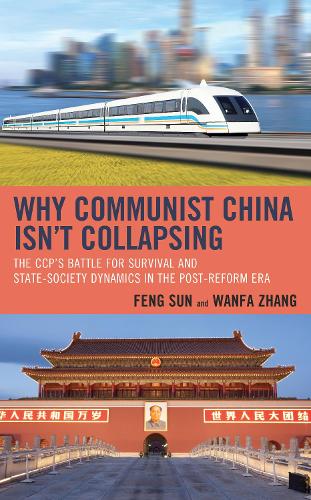
Why Communist China isnt Collapsing: The CCPs Battle for Survival and State-Society Dynamics in the Post-Reform Era
(Paperback)
Available Formats
Publishing Details
Why Communist China isnt Collapsing: The CCPs Battle for Survival and State-Society Dynamics in the Post-Reform Era
By (Author) Feng Sun
By (author) Wanfa Zhang
Bloomsbury Publishing PLC
Lexington Books
18th October 2021
United States
Classifications
Professional and Scholarly
Non Fiction
Far-left political ideologies and movements
Left-of-centre democratic ideologies and movements
324.251075
Physical Properties
Paperback
280
Width 154mm, Height 218mm, Spine 19mm
490g
Description
This book is a comprehensive synthesis of how the Chinese Communist Party (CCP) has fought on various fronts for survival since the reform refuting the China Collapse thesis by scrutinizing current realities, the proactive strategies adopted by the CCP and the critical role of traditional political culture, and the international environment in shaping state-society dynamics in China.
More importantly, the book conducts a deep analysis of the reasons that this authoritarian regime could act responsively and progressively. The CCP possesses strong vigilance and adaptability assets which have helped it survive various crises over the past decades. This book scrutinizes the Chinese cultural environment as well as the political perception and economic interests of major social actors presumed to be forces with potential power to topple the regime. Both the state-dependency resulting from a late developer context and the elements of collectivism and rule by virtue in traditional Chinese culture play critical roles in shaping public attitudes toward the CCP regime.
Reviews
Challenging Western scholars and journalists who foresee China's collapse, Sun (Troy Univ.) and Zhang (Florida Institute of Technology) propose that communist leadership has devised a resilient, flexible system through what they call "Comcapitalism," a blend of capitalism and socialism, and "Comfucianism," a graft of traditional values on to Party rule. Coercion remains, but officials "channel mass discontent into constructive activities" that address local issues. Clever, but is it a stable, long-term solution The authors present empirical data showing that most Chinese are content and patriotic, and they refute the Western modernization theory that economic growth forms a middle class and thus leads to democracy. That scenario, they write, does not fit Chinese history and culture. Sun and Zhang deem factionalism, corruption, and labor and peasant unrest under control. This book was published a little too early to include Xi Jinping's tightening and reemphasis on state-owned enterprises and difficulties with debt, Xinjiang, and Hong Kong. Middle-way communist experiments (e.g., those of Tito and Gorbachev) alternated between loose and tight, never finding stability. This is now possibly China's pattern. The authors' offer a testable proposition: if the Beijing regime endures without systemic upheaval, they will have been proven right. . . Summing Up: Recommended. Upper-division undergraduates through faculty.
* CHOICE *Why has the Chinese Communist Party not collapsed The answer is simple: because it has gained the trust of the people. Why has it gained the trust of the people The answer is complex and this book sheds much light; it is a must-read for anyone who wants to understand contemporary Chinese politics. -- Daniel A. Bell, Shandong University, author of The China Model
Why Communist China Isnt Collapsing attempts to explain the survival of the Chinese Communist regime. The authors argue that its legitimacy has a solid foundation in terms of Chinese political theory and political culture. As China now faces a deteriorating domestic and international environment, their thesis deserves careful consideration by those concerned with its future. -- Joseph Y.S. Cheng, City University of Hong Kong
This book is a timely overview of the factors behind Chinas remarkable economic success and rise to power that challenges conventional wisdom predicting either the collapse or democratization of China. While drawing on, and often dismissing the relevance of the western academic literature and theories, Sun and Zhang present a detailed insiders view of state-society relations that is largely sympathetic to the leadership role of the Chinese Communist Party as a responsive authoritarian regime. -- Randall Peerenboom, retired professor of law, University of California, Los Angeles, and author of China Modernizes: Threat to the West or Model for the Rest
Author Bio
Feng Sun is associate professor in the department of political science at Troy University.
Wanfa Zhang is associate professor of political science at Florida Institute of Technology.
